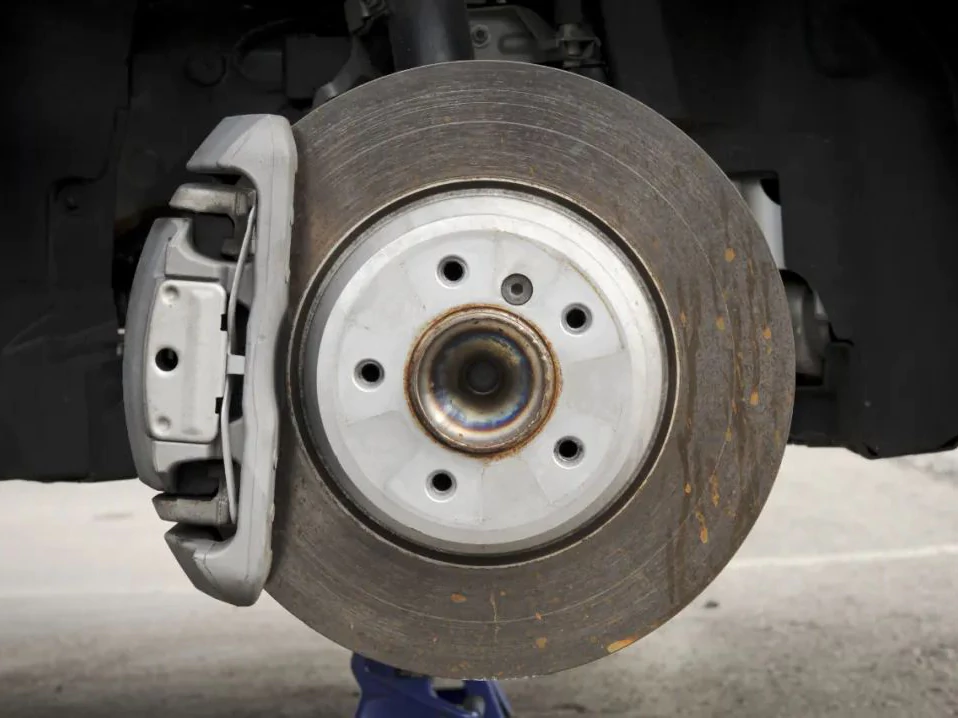In the UAE, faulty brakes are a leading cause of car accidents, with statistics showing that nearly 20% of road accidents are attributed to brake failure. Recognizing the signs of worn brake pads can prevent accidents and ensure your safety on the road.
In this blog post, we’ll delve into the 6 most common symptoms of bad brake pads, their underlying causes, and the estimated replacement costs in the UAE.
What are Brake Pads? How Often You Should Replace Brake Pads?
Brake pads are part of the vehicle’s braking system. They are typically made of a composite material, often containing metal, ceramic, or carbon fibers, and are designed to create friction with the brake rotors when applied. This friction slows down and eventually stops the vehicle.
When brake pads go bad, they put the lives of your loved ones at risk. Therefore, it is highly recommended that you replace your brake pads every 35,000-40,000 km. However, you should check the brake pads of your car for wear and tear at least once a month to ensure safety.

6 Symptoms of Bad Brake Pads
Here are the 6 major symptoms that your brake pads are going bad:
1. Metal-on-Metal Grinding Noise from Brakes
When the brake pads wear down to the metal backing plate, it creates a harsh grinding noise as the metal rubs against the rotor. This is a clear indication that the brake pads are dangerously worn and need to be replaced immediately. If you hear this noise, avoid driving the car until the brakes are repaired to prevent further damage to the rotors and other components.
2. It’s Taking Longer to Stop the Car
As brake pads wear down, they become less effective at stopping the car. If you notice that your car is taking longer to stop than usual, it’s a good idea to have the brakes inspected by a mechanic.
3. Vibrations in Brake Pedal
Worn brake pads, especially if they’re worn unevenly, can create a pulsating sensation in the brake pedal. This is because the pads are not making consistent contact with the rotor. If you notice vibrations in the brake pedal, it’s important to have the brake pads inspected.
4. Car Pulling to One Side
This phenomenon, often referred to as “brake pull,” occurs when the braking force is unevenly distributed across the vehicle. One of the primary causes of this issue is uneven brake pad wear; if the brake pads on one side are more worn than those on the other, the side with the less worn pads will exert more stopping power, causing the vehicle to veer in that direction.
5. Brake Fluid Leaks
When brake pads wear down excessively, they can cause damage to other components in the braking system, leading to fluid leaks. As the brake pads become thin, they can cause the brake caliper pistons to stick or retract unevenly, putting pressure on the caliper seals and brake hoses. This pressure can lead to cracks, holes, or other damage, allowing brake fluid to escape.
6. Squeaking or Squealing Noise
Some brake pads have a built-in wear indicator that produces a high-pitched squealing noise to indicate wear. This is a sign that the pads need to be replaced soon. However, not all brake pads have wear indicators, so this symptom may not always be present. If you hear a squeaking or squealing noise from your brakes, it’s a good idea to have them inspected to determine the cause.

What Causes the Brake Pads to Go Bad?
Many things can cause the brake pads to go bad. Here are a few of them:
- Normal Wear and Tear: This is the most common cause of brake pad wear. Over time, the friction between the brake pads and rotors causes them to gradually wear down.
- Overheating: Excessive heat can accelerate brake pad wear, especially in the hot weather of the UAE. However, this can also occur during heavy braking, such as in stop-and-go traffic or on steep hills, or if the brakes are not properly ventilated.
- Contamination: Brake pads can become contaminated with dirt, grease, or other substances that can reduce their effectiveness and cause them to wear down faster.
- Defective Brake Calipers: If a caliper is sticking or not releasing properly, it can apply excessive pressure to the brake pads, causing them to wear out faster.
- Excessive Weight: Carrying excessive weight in your vehicle can put extra strain on the brakes, causing them to wear down faster.
- Aggressive Driving: Driving aggressively, such as hard braking or speeding, can put excessive stress on the brakes and cause them to wear down prematurely.
- Poor Maintenance: Neglecting to replace worn brake pads or having your brakes inspected regularly can lead to further damage and increased maintenance costs.
- Low-Quality Brake Pads: Using low-quality or counterfeit brake pads can also contribute to premature wear. These pads may not be able to withstand the heat and pressure.

Brake Pads Replacement Cost in the UAE
The total replacement cost for brake pads in the UAE is somewhere between 500-2,500 AED. 70% of this cost goes into buying brake pads, whereas the remaining 30% is labor cost. There are usually four to eight brake pads in most cars. So, the total cost to replace brake pads is tied to the number of brake pads, the type of brakes, and, most importantly, the repair shop you choose.
For example, regular sedans like the Toyota Corolla have 4 brake pads. You can find a good quality set of four Toyota Corolla brake pads for 200-300 AED, while the replacement labor is another 200-300 AED. So, the total cost comes to around AED 500. However, if you own a Mercedes or any other high-end brand with specialized brakes, it can cost up to AED 2,500 or even more.
Final Word: 6 Bad Brake Pads Symptoms
By being aware of the six common symptoms discussed in this blog post, you can take proactive steps to maintain your vehicle’s braking system. If you notice any of these symptoms, don’t hesitate to have your brakes inspected by a qualified mechanic.
Looking to import Chinese cars to the UAE? We can help. GuangcaiAuto is your partner in importing reliable and efficient Chinese cars.
We offer cars from 60+ worldwide auto brands. With our efficient shipping and streamlined import process, bringing your dream car to your doorstep is easier than ever.
Get in touch with our sales team for more information, and don’t forget to explore our blog for the latest news and offers from the Chinese car market.


